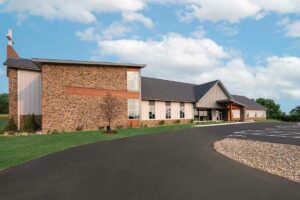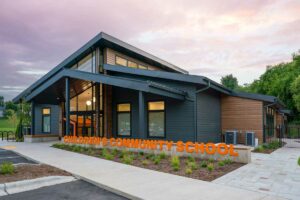Funding building projects for churches and nonprofits can be a challenge, but there are options beyond fundraising and traditional bank loan financing
supporter loans
 Rather than relying on a traditional bank loan for building project funds, a loan could be provided by one or more project supporters. This financing strategy can work for either churches or nonprofits. “It is a great concept that isn’t used as often as I think it should be,” says Jeff Grundahl, owner and chief executive officer of Madison-based general contractor JG Development and its divisions (including NCI-Roberts Construction). The idea is that a supporter (or multiple supporters) provide a building loan to an organization, possibly at a lower rate of interest than a typical lender will offer. The investor(s) could see a steady return on their money, so the system can benefit all parties. “There may be different potential lenders for a project than donors,” says Jeff, “so this strategy can utilize funds that might not otherwise be offered.”
Rather than relying on a traditional bank loan for building project funds, a loan could be provided by one or more project supporters. This financing strategy can work for either churches or nonprofits. “It is a great concept that isn’t used as often as I think it should be,” says Jeff Grundahl, owner and chief executive officer of Madison-based general contractor JG Development and its divisions (including NCI-Roberts Construction). The idea is that a supporter (or multiple supporters) provide a building loan to an organization, possibly at a lower rate of interest than a typical lender will offer. The investor(s) could see a steady return on their money, so the system can benefit all parties. “There may be different potential lenders for a project than donors,” says Jeff, “so this strategy can utilize funds that might not otherwise be offered.”
Sometimes the financing terms become even more favorable for the organization. Over the course of the loan period, “some capable lenders might forgive part or all of their loan, essentially turning their money into a grant,” says Jeff.
DENOMINATION-BASED RESOURCES
For churches, many denominations offer resources to enable expansion, improvement and maintenance of their facilities.
 Several of NCI-Roberts’ clients have received support from the Wisconsin Evangelical Lutheran Synod (WELS) Church Extension Fund (CEF). According to the WELS CEF website, the organization “provides loans and grants to qualified mission congregations so they can acquire land and build or renovate ministry facilities – used as tools for gospel outreach.” NCI-Roberts client Good News Lutheran Church funded its new church thanks in part to a grant from WELS CEF.
Several of NCI-Roberts’ clients have received support from the Wisconsin Evangelical Lutheran Synod (WELS) Church Extension Fund (CEF). According to the WELS CEF website, the organization “provides loans and grants to qualified mission congregations so they can acquire land and build or renovate ministry facilities – used as tools for gospel outreach.” NCI-Roberts client Good News Lutheran Church funded its new church thanks in part to a grant from WELS CEF.
When New Heights Lutheran Church decided to remodel the former Mazomanie Elementary School into a community center and worship space called The Grove, they received a loan from the Mission Investment Fund (MIF), a financial ministry of the ELCA. “MIF offers competitive rates and specializes in congregational and social ministry funding,” says Faith Fehlen, the church administrator for New Heights. “They could also provide us with hands-on assistance with the loan application process, and flexibility later on in the mortgage timeline pending ongoing congregational health and stability.”
LOCATION-BASED RESOURCES
Funding sources from the Wisconsin Economic Development Corporation (WEDC) are available based on a project’s purpose and location. WEDC’s Community Development investment grant is one that several NCI-Roberts clients have explored. The grant supports development efforts, especially for projects with positive community impact located in downtown areas.
 When Children’s Community School in Mount Horeb was exploring funding strategies for its new building, they learned of opportunities available through the USDA Rural Development Community Facilities Direct Loan & Grant Program. The school qualified for a low-interest direct loan because it is a community-based nonprofit organization in a rural area, but the Department also offers grants, loan-grant combinations, and a loan guarantee program.
When Children’s Community School in Mount Horeb was exploring funding strategies for its new building, they learned of opportunities available through the USDA Rural Development Community Facilities Direct Loan & Grant Program. The school qualified for a low-interest direct loan because it is a community-based nonprofit organization in a rural area, but the Department also offers grants, loan-grant combinations, and a loan guarantee program.
NCI-ROBERTS CAN HELP
Need more funding and financing inspiration? If you haven’t already, check out the NCI-Roberts Resource Fundraising Considerations for Churches and Nonprofits. If your organization is considering building or remodeling, learn more about NCI-Roberts’ philosophy and process, and contact us with any questions you have.